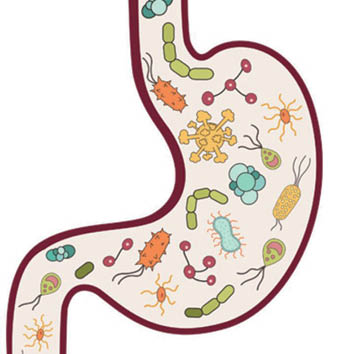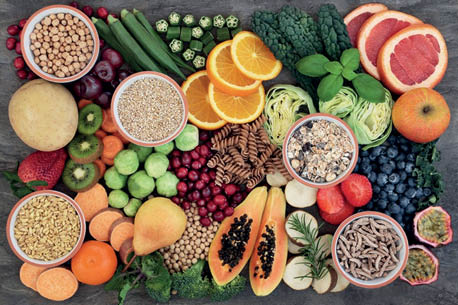Dr. Danesh D. Chinoy is a leading Health and Wellness Coach, Sports Physiotherapist and Psychologist. He is also a prominent Facilitator, Educator and Administrator, Physiotherapist (Sports & Manual Therapy), Corporate Trainer and Psychologist. He is dedicated to guiding clients to succeed while inspiring an insatiable passion for learning and helping all to heal holistically and remain fighting fit for life. With a Doctorate in Sports Physiotherapy and a Masters in Psychology, Dr. Chinoy’s two-decades’ rich expertise has won him innumerable awards, nationally and globally. He is on a mission to serve society by empowering all to reach their peak performance. Connect with Dr. Chinoy with your comments, suggestions and queries at: daneshchinoy@gmail.com .
 Water Pickles and Parsi delicacy, ‘Sandhras’, will certainly not be the first examples that jump to mind when you think of healthy eating, but a growing body of research shows that a diet that includes a regular intake of fermented foods, bring in a host of health benefits. Doctors these days recommend people to consume more of fermented foods containing high amounts of probiotics, which has always been an integral part of our ‘desi’ food culture and also very helpful to keep our digestive and the immune system robust.
Water Pickles and Parsi delicacy, ‘Sandhras’, will certainly not be the first examples that jump to mind when you think of healthy eating, but a growing body of research shows that a diet that includes a regular intake of fermented foods, bring in a host of health benefits. Doctors these days recommend people to consume more of fermented foods containing high amounts of probiotics, which has always been an integral part of our ‘desi’ food culture and also very helpful to keep our digestive and the immune system robust.
Fermented foods have been produced, as per the knowledge passed down the generations, with little understanding of the potential role of the microorganism involved in the process. While research into the health benefits of fermented foods is relatively new, the process of fermentation has long been used to help foods last longer and keep them from spoiling. Most societies worldwide have included fermented foods as part of their diet. One of the earliest forms of food preservation, fermentation can extend the usability of any food for months. For example, if you leave any vegetable unattended for a few days, it’ll spoil, but if you ferment it into a pickle, it will last for months.
Fermented foods are obtained through the action of microorganisms, namely bacteria, yeasts, and mycelial fungi, and their enzymes, in a process referred to as ‘fermentation’. Microorganisms may be indigenously present on the substrate (surface), or added as a starter culture, or they may be present in or on the ingredients and utensils, or in the environment. Basically, a suitable substrate, appropriate microorganisms and environmental conditions (temperature, pH, and moisture) must coexist to enable food fermentation.
In addition to helping food last longer, fermentation also enhances the taste of foods, with bettered flavour and texture. It changes the biochemistry,’ adding nutrients. For eg., fermented vegetables provide vitamin B12 and other important B group vitamins.
 But, one of the biggest benefits of fermented foods comes from probiotics. Recent research shows that the type of gut bacteria in our bodies is changing. One reason is that the microbiomes in our bodies aren’t being regularly replenished (as was the case with previous generations) due to changes in our eating habits – particularly processed foods, and because of ‘better’ hygiene, which cuts down on the number of microbes that people should be exposed to naturally, through soil. In addition, antibiotics and pesticides used widely, delete the beneficial organisms as collateral damage.
But, one of the biggest benefits of fermented foods comes from probiotics. Recent research shows that the type of gut bacteria in our bodies is changing. One reason is that the microbiomes in our bodies aren’t being regularly replenished (as was the case with previous generations) due to changes in our eating habits – particularly processed foods, and because of ‘better’ hygiene, which cuts down on the number of microbes that people should be exposed to naturally, through soil. In addition, antibiotics and pesticides used widely, delete the beneficial organisms as collateral damage.
This change in the number of gut microbes may create an imbalance between beneficial and harmful gut bacteria, leading to numerous health issues. When the digestive tract has an unhealthy mix of organisms, it leads to weakening of the intestine-walls, which start to leak their contents into the bloodstream – a condition referred to as the ‘Leaky Gut Syndrome’. Chronic exposure to these leaked substances has been linked to a host of health problems, including asthma, eczema, schizophrenia and Alzheimer’s disease. Fermented foods fortify the gut microbiome, creating a healthier mix of microbes and strengthening the walls of the intestines to keep them from leaking.
Consuming probiotics (like those found in fermented foods) from early childhood, helps train the immune system to tolerate and cooperate with a diverse, beneficial microbiome. After the first few months and years of life, a person’s microbe population is relatively stable, but adults who eat fermented foods regularly can still reap benefits.
However, please note that not all fermented foods are created equal. For instance, although cheese is a fermented product, it’s not known to bring the same health benefits as curd. The difference is live microbes – curd has them, cheese typically doesn’t. But then again, although high in probiotics, curd from animal milk contains milk proteins and thus will still carry the ill-effects of dairy. So, I would suggest curd and curd-based preparations like ‘Chaas’ to be made only from plant-based milk such as soy, coconut or other nut based milks. Although, curd preparations might be the easiest fermented food for us Indians to consume, because we’re already familiar with it, I encourage people to extend their range a little bit. In addition to eating raw and cooked vegetables, add pickled vegetables on a side with dinner or adding it to the plant-based raita or ‘kachumber’.
Home-made, naturally fermented, water-based pickles are amazing for the health of your gut. They contain tons of antioxidants, vitamins and minerals, which a store-bought jar of oily pickles may not contain. My favourite is pickled turmeric tubers, which my mom prepares when fresh turmeric tubers are in season. Turmeric is a power-house in itself and its added fermentation benefits are a must have!
Idli, Dosa, Dhokla and fermented Kanji are some other common fermented dishes that even we are fond of as snacks and even main course at times, thanks to our multicultural ‘Aamchi Mumbai’. I again suggest we take the effort to prepare these dishes at home with their traditional recipes rather than ready to eat packets. I am doubtful of any health benefits that preservative laden heat and eat packs would provide.
There are many fermented dishes from other Indian states that appease the Bawa palate – ‘Ambali’ is a finger millet or ragi-based fermented semi-liquid beverage, native to Southern India, containing high amounts of calcium and is also endothermic, meaning it cools the body and is especially beneficial during the hot Indian summers. Native to Orrisa, ‘Enduripitha’ is prepared during the Prathamastami festival. A fermented batter of parboiled rice and black-gram is applied onto a turmeric leaf. The leaf is then folded mid-vain and cooked gently over the steam. Not only do the turmeric leaves have beneficial antibiotic properties, but the fermentation enhances the nutritional quality of the black-gram and rice.
So, friends, do Include a variety of fermented foods that help in replenishing the microflora of your gut to keep you smiling!
- Move Bawa Move!! - 15 March2025
- The Healing Power Of ‘Shinrin-Yoku’ (Forest Bathing) - 28 December2024
- The Incomparable Health Benefits Of Plant-Based Diet - 30 November2024
